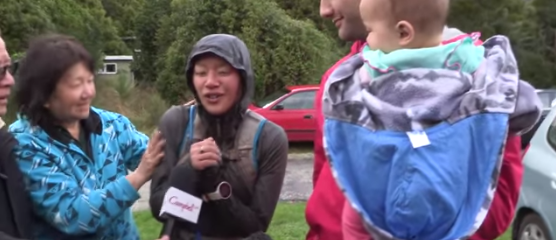Lost Woman Drinks Own Breast Milk To Stay Alive: ‘If You’ve Got Access To Breast Milk, You’ve Got Access To Life’

A 29-year-old mother who was participating in a 20km run through a New Zealand forest got lost in the bushes and spent a night in the forest trying to find her way out.
Susan O’Brien was expected to finish the race at 11:30 a.m., but by 1 p.m. there was still no trace of her, and her family and husband became worried. She wasn't found until 24 hours later, after spending a cold night in the woods alone. During that time, O’Brien explained that she had waited in the forest, dug a hole in the ground to sleep, and used some of her own breastmilk in the hopes of sustaining her energy.
“I’m breastfeeding my baby so I had a bit of my milk, which I thought, that should help me keep going,” O’Brien told New Zealand Radio. “I wanted to carry on, but I got too exhausted so I just dug a hole.”
After being found, O’Brien was greeted by her overjoyed parents, husband, and baby, and was found to be in good health.
But was it the breast milk that helped keep her spirits and energy up? Though it was only 24 hours, some lactation experts believe breast milk is a good way to sustain oneself in survival situations. While using her own lactation for one night may have helped her, doing so over the course of days or weeks would ultimately use up her energy and fat reserves. In short, surviving off your own breast milk while lost in the woods probably wouldn’t last very long, but it can certainly help.
Breast milk is packed with nutrients and vitamins that are meant to sustain and nurture a newborn. However, some believe that the calories, hydration, and electrolytes in breast milk can be healthy to adults, too — especially to someone surviving in the wilderness. It's likely the electrolytes helped restore O'Brien's body after her run and thus her energy.
"During a period of prolonged starvation, it could be very useful and life-saving, assuming there were continued supplies of water for the lactating mother to drink in addition to the milk," Dr. Joan Younger Meek, an associate dean for graduate medical education at the Florida State University College of Medicine, told Yahoo! Health.
As one lactation expert told Newser, “If you’ve got access to breast milk, you’ve got access to life.”



























